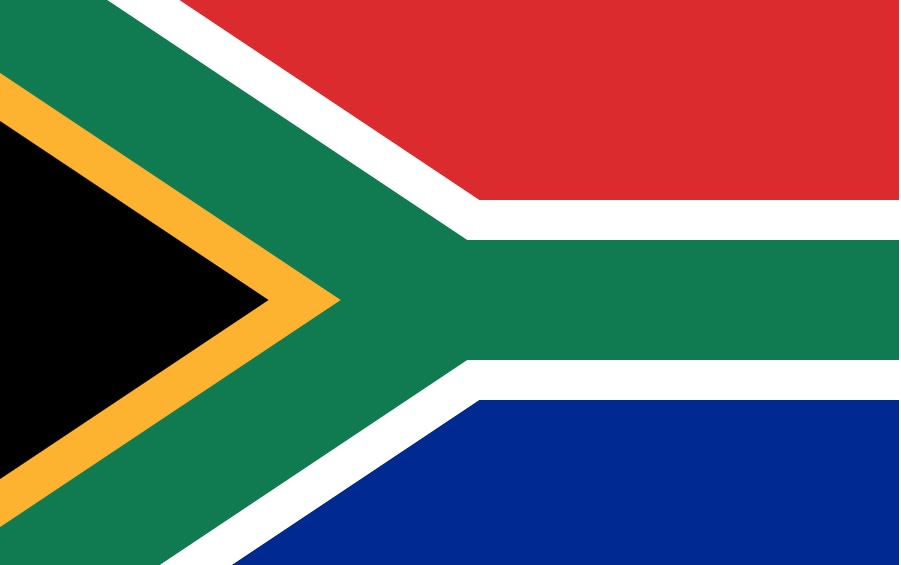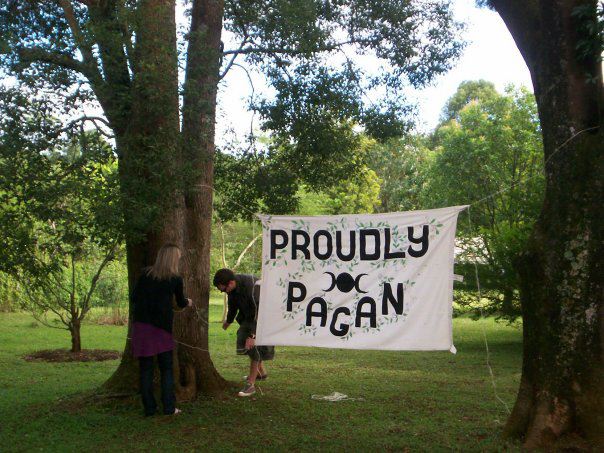ASHEVILLE (TWH), North Carolina – In the United States, most Witches and Pagans have little to fear these days from being identified as such. Many practice openly, holding their events in public spaces, advertising their groups and events in local media. There has even been a resurgence in brick-and-mortar shops that sell occult tools and cater to those whose spiritual practice fall under the umbrella of Neo-Paganism. In other parts of the world and despite the fact that many identified as “witches” have nothing to do, spiritually or culturally, with witches or witchcraft sense, Most seriously, the accusation of witchcraft can be a death sentence.
The South African Pagan Rights Alliance (SAPRA) has been a leader exposing this travesty to the world. TWH sat down with Damon Leff, a South African Pagan involved in education and advocacy for human rights and religious freedom. This is the first part of a two-part interview and a subsequent on witchcraft claims and their consequences around the world.

Flag of South Africa [Public Domain]
DL: I self-identify as a Witch. I have done so since the age of 12 (53 now). I’m a founding member (with ShanynTamra Pearson, Candace Jane McCardle and MorgainneEmrhys), and honorary elder of the Grove, founded in 1996. I hold the title of Magus of my own coven, the Clan of Ysgithyrwyn, founded in 1998. I have publicly identified as a Pagan since 1995, the same year I started publishing Penton Pagan Magazine.
TWH: Can you tell us a little about why SAPRA was created and what motivated you to get involved, especially since the majority of people being murdered do not identify as Pagan, or Witches?
DL: The South African Pagan Rights Alliance (SAPRA) is a voluntary association formed in 2004 as a human rights activist alliance. In 2008 SAPRA was designated as a religious organisation in terms of section 5 of the Civil Union Act (Act 17 of 2006), and its religious marriage officers may solemnise both same-sex and heterosexual marriages. We are currently a registered NGO and function as a paralegal advocacy organisation. SAPRA is an Executive Member of the South African Pagan Council (SAPC) and Chair of the SAPC Law Reform Committee. SAPRA is also a participating member of the Witchcraft and Human Rights Information Network (WHRIN).
SAPRA was created to promote the constitutional rights to religious freedom and equality of Pagans in South Africa. Our primary advocacy work is still focused on challenging discrimination against Pagans.
In 2007 our executive made a decision to turn our advocacy focus to ongoing witch-hunts in our country.
It is important here to explain that whilst the victims of witch-hunts in my country are not Witches or practitioners of Witchcraft, but rather innocent victims of false accusation, we could not ignore that our growing community of Pagan Witches could become victims of similar accusations, nor could we ignore that no other NGO was active in this field (witch-hunts) of human rights advocacy.
TWH: How many of them are Christians? How many of them are actually practicing anything that could even be described as magical?
DL: A vast majority of victims of accusation and violence self-identified / identify as Christians. Many are also followers of traditional African religion. The two faiths are practiced side by side by a majority of South Africans. A small percentage of victims identified as Traditional healers – their accusers were other traditional healers, and the disputes originated as a result of territorial competition. South Africa also has large Jewish, Muslim and Hindu populations.
Pagans remain one of the smallest religious minorities in South Africa, and although Pagans do encounter prejudice and discrimination, largely from a Christian majority, we do not experience violent witch-hunts.
Witch-hunts in South Africa are largely perpetrated by individuals and groups who believe that misfortune is enabled through the agency of ‘a witch’. Such accusations are sometimes motivated through localized forms of religious extremism by practitioners of traditional African religions, who believe that witchcraft is always the cause of misfortune, traditional healers (including diviners, herbalists, ‘witch-doctors’) who use various forms of divination to point out suspected witches, and charismatic revivalist Christian religious leaders (pastors and prophets) who use their prejudicial notions of witchcraft as a manifest form of satanic evil to encourage their followers to find (accuse) and convert suspected witches.
TWH: What is the real motivation behind most of the killings?
DL: Witch-hunts in South Africa are largely perpetrated by individuals and groups who believe that misfortune is enabled through the agency of ‘a witch’. Such accusations are sometimes motivated through localized forms of religious extremism by practitioners of traditional African religions, who believe that witchcraft is always the cause of misfortune, traditional healers (including diviners, herbalists, ‘witch-doctors’) who use various forms of divination to point out suspected witches, and charismatic revivalist Christian religious leaders (pastors and prophets) who use their prejudicial notions of witchcraft as a manifest form of satanic evil to encourage their followers to find (accuse) and convert suspected witches.
In February 2007 SAPRA submitted a formal request to the South African Law Reform Commission to review the Witchcraft Suppression Act of 1957. This Act criminalises identifying as a witch and professing knowledge of witchcraft. The Commission found in 1997 that the Act was unconstitutional to the extent to which it prohibited the right to religious identity for self-identifying Witches. South Africa’s Constitution does not prohibit religious identity or practice, but protects the right to religious freedom for all citizens. The Act has not yet been repealed.
In June 2007, the Office of the Premier of Mpumalanga Province leaked a draft Witchcraft Suppression Bill. The Bill sought to reinforce the Witchcraft Suppression Act by criminalising identifying as a witch. The Bill sought to suppress witchcraft and to imprison self-identified Witches on the assumption of automatic inference of criminality.
In submitted formal objections to the proposed Suppression Bill, the South African Pagan Council (SAPC) and SAPRA, supported by Pagans across the country who define themselves as Witches, criticised the Mpumalanga legislature’s decision to base their Bill on a piece of Apartheid legislation – the Witchcraft Suppression Act (Act 3 of 1957 as amended by Act 50 of 1970). The Bill was defeated.
SAPRA launched our first annual 30 days of Advocacy against Witchcraft accusations and witch-hunts on 29 March 2008, with the publication of a book – A Pagan Witches Touchstone. http://www.paganrightsalliance.org/documents/A_Pagan_Witches_Touchstone.pdf
We encouraged South African Pagans to speak out against religious discrimination against Witchcraft, and against Witchcraft-related violence in South Africa.
Our advocacy website – https://www.paganrightsalliance.org/advocacy/
Since 2008 the South African Pagan Rights Alliance has repeatedly appealed to the South African Commission for Human Rights to encourage the South African government to:
- halt the persecution of suspected or accused witches,
- uphold and strengthen a culture of human rights for all equally,
- respond appropriately and humanely to incidences of accusations of witchcraft,
- make the eradication of violence against suspected witches an international priority,
- train local police to manage witchcraft accusations and violent witch-hunts in a way that affirms the dignity and humanity of those accused of practising witchcraft,
- create victim support units to facilitate reintegration and conciliation of those accused,
- adopt comprehensive public education and awareness programmes aimed at eradicating the real causes of witchcraft accusations, and
- reform legislation that currently seeks to suppress witchcraft or criminalize accused witches.
* These recommendations were first adopted by the 1995 Ralushai Commission, but were never implemented.

Pagan Freedom Day in South Africa 2009 [Photo Credit: Ginney May / Wikimedia]
DL: For SAPRA, it’s a matter of promoting Constitutional human rights for all South Africans. South African Pagan Witches cannot assume that we will not become victims of accusation of violence, and we cannot in good conscience ignore witch-hunts against innocent victims of prejudice. We must acknowledge our historical privilege, and use that privilege for change.
Accusations of witchcraft and witch-hunts are not protected under Constitutional rights to freedom of religion, belief, opinion and expression, as incitement to propaganda for war; incitement of imminent violence; or advocacy of hatred based on race, ethnicity, gender or religion, that constitutes incitement to cause harm, is not protected under South African law.
Accusations of witchcraft and resulting witch-hunts constitute a series of clearly identified crimes under both international and national law.
In almost all cases of accusation of witchcraft, the accused will:
- not be offered access to legal defence against the accusations,
- not be considered innocent until proven guilty in a court of law,
- be driven from their communities,
- lose their homes as a result of arson,
- be forcibly separated from their families, loved ones and friends,
- be placed in custody by the South African Police Services, ostensibly for their own safety, spending at least one night in a prison cell to avoid being attacked by members of their own community,
- may never return to their homes and communities of birth, and
- be forced into unwilling exile in unofficial and unacknowledged refugee camps.
By being denied access to counselling and restorative justice, the living victims of accusation – refugees of incitement, hatred and violence – are not afforded any assistance or protection. This must and is being addressed.
As a paralegal advocacy NGO we need to be involved, to condemn accusations and violence, to challenge human rights abuses when they occur, to obligate our government to take responsibility. It is a moral and ethical obligation for Witches to condemn witch-hunts, even when the victim is not a Witch!
Next week will TWH publish the second half of the interview with Damon Leff.
The Wild Hunt is not responsible for links to external content.
To join a conversation on this post:
Visit our The Wild Hunt subreddit! Point your favorite browser to https://www.reddit.com/r/The_Wild_Hunt_News/, then click “JOIN”. Make sure to click the bell, too, to be notified of new articles posted to our subreddit.